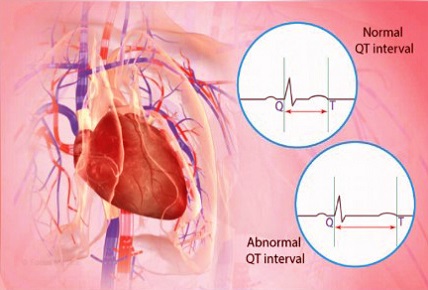Nikhil Prasad Fact checked by:Thailand Medical News Team Dec 24, 2024 1 year, 1 month, 1 week, 2 days, 18 hours, 12 minutes ago
Medical News: The global pandemic brought on by COVID-19 has left lasting impressions on the medical world, not only for its respiratory effects but also for its implications on cardiovascular health. In an enlightening study conducted by researchers from the Second Affiliated Hospital of Wannan Medical College and the Vascular Diseases Research Center of Wannan Medical College in China, profound insights into how COVID-19 impacts cardiac electrophysiology have emerged. The study, recently published, sheds light on the dynamic changes in electrocardiographic parameters among COVID-19 patients, particularly the QTc interval.
 COVID-19 Causes QTc Prolongations and Disruptions in Cardiac Electrophysiology
The Study’s Framework
COVID-19 Causes QTc Prolongations and Disruptions in Cardiac Electrophysiology
The Study’s Framework
The research team, led by Dr. Dasheng Lu, undertook a retrospective analysis of 303 inpatients diagnosed with COVID-19. These patients were observed at a tertiary Grade A hospital in China between August 2022 and December 2023. The study aimed to track changes in QTc intervals - a corrected measure of the heart’s electrical cycle duration - before, during, and after COVID-19 infection. Inclusion criteria mandated that each participant have at least two electrocardiogram (ECG) recordings at three pivotal stages: pre-infection, during acute infection, and post-recovery (beyond one month).
The patient cohort had an average age of 72.8 years, with 62% being male. Most participants had existing health conditions such as hypertension (63.6%) and diabetes (27.2%). This
Medical News report underscores the importance of monitoring QTc intervals to understand COVID-19’s impact on cardiac health.
Key Findings: Prolonged QTc and Age Correlation
A significant highlight from the research was the observation of prolonged QTc intervals during COVID-19 infection compared to pre-infection levels. The average QTc increased from 433.9 ms before infection to 438.3 ms during acute infection, a change deemed statistically significant (p = 0.025). This prolongation was especially prominent in older individuals, reflecting a positive correlation between age and QTc intervals both before (r = 0.23) and during infection (r = 0.19).
Short-term follow-up (within six months post-recovery) revealed that QTc intervals remained similar to those during infection. However, long-term follow-up (beyond six months) showed a significant decrease in QTc intervals, suggesting potential recovery. The average QTc dropped to 429.6 ms from 437.5 ms in this period (p = 0.002).
Changes in P-Wave Duration
The study also delved into changes in P-wave duration, a marker for atrial electrical activity. While no significant differences were observed between pre-infection and acute infection durations, a marked decrease was noted in the long-term post-recovery phase. The average P-wave duration reduced from 99.5 ms during infection to 96.4 ms post-recovery (p = 0.024). These findings could hint at the heart’s gradual normalization after the acute phase of COVID-19.
t;
The Broader Implications
Prolonged QTc intervals are a known risk factor for arrhythmias, which can lead to severe outcomes such as sudden cardiac death. This research indicates that while COVID-19 infection acutely disrupts cardiac electrophysiology, many of these changes are reversible over time. However, the persistence of QTc prolongation in the short-term post-recovery phase underscores the importance of continued cardiac monitoring, particularly in high-risk groups like older adults.
The findings also align with previous studies highlighting the association between COVID-19 and cardiac arrhythmias. Notably, earlier research revealed that atrial fibrillation - a common arrhythmia - is prevalent in COVID-19 patients and significantly raises mortality risks. The observed decline in P-wave duration post-recovery may signify a reduced risk of such arrhythmias over time.
Limitations of the Study
Despite its compelling findings, the study acknowledged several limitations. The patient cohort, drawn from hospitalized cases, may not represent the broader population with milder COVID-19 symptoms. Additionally, the reliance on standard 12-lead ECGs limited the ability to capture transient arrhythmic events. The relatively short follow-up duration also left unanswered questions about long-term sequelae.
Conclusions and Future Directions
The study conclusively demonstrated that COVID-19 infection is linked to prolonged QTc intervals and disruptions in cardiac electrophysiology. While these alterations often persist in the short term, they show promising signs of resolution over extended follow-up periods. The results suggest that the heart’s electrical system may gradually recover from the acute insults of COVID-19, reflecting the resilience of cardiac tissues. However, the persistence of electrophysiological changes in the short-term warrants caution and continued vigilance.
Future research should focus on understanding the mechanisms underlying these changes. Are they driven by direct viral injury, systemic inflammation, or a combination of both? Longitudinal studies with extended follow-ups and diverse cohorts will be instrumental in answering these questions and informing long-term management strategies for COVID-19 survivors.
The study findings were published in the peer-reviewed journal BMC Cardiovascular Disorders.
https://link.springer.com/article/10.1186/s12872-024-04405-w
For the latest COVID-19 News, keep on logging to Thailand
Medical News.
Read Also:
https://www.thailandmedical.news/news/latest-covid-19-news-sars-cov-2-causes-heart-muscle-cells-cardiomyocytes-to-fuse-and-disrupts-heart-s-electrical-rhythm
https://www.thailandmedical.news/news/covid-19-news-mayo-clinic-study-shows-that-sars-cov-2-spike-protein-mediates-cardiomyocyte-fusion-leading-to-increased-arrhythmic-risk
https://www.thailandmedical.news/news/covid-19-news-israeli-study-finds-that-sars-cov-2-infections-can-trigger-new-onset-atrial-fibrillation
https://www.thailandmedical.news/news/romanian-study-review-uncovers-how-covid-19-leads-to-arrhythmogenesis
https://www.thailandmedical.news/news/mechanisms-that-trigger-cardiac-arrhythmia-in-covid-19
https://www.thailandmedical.news/news/cleveland-clinic-and-northwestern-university-study-shows-that-metformin-could-be-repurposed-to-treat-atrial-fibrillation-findings-relevant-in-covid-se
https://www.thailandmedical.news/news/landiolol-shows-promise-as-a-new-treatment-for-heart-patients-with-atrial-fibrillation
https://www.thailandmedical.news/news/medical-news-researchers-claim-that-fibrinaloid-microclots-could-be-behind-atrial-fibrillation-relevant-for-sars-cov-2-context
https://www.thailandmedical.news/news/breaking-new-york-study-finds-that-sars-cov-2-virus-damages-heart-pacemaker-cells-and-causes-arrhythmias
https://www.thailandmedical.news/news/john-hopkins-proposes-new-echocardiogram-diagnostics-that-can-identify-covid-19-patients-that-are-at-risk-of-developing-atrial-fibrillation
https://www.thailandmedical.news/news/covid-19-clinical-care-electrocardiographic-ecg-abnormalities-and-troponin-levels-can-envisage-covid-19-mortality
https://www.thailandmedical.news/news/covid-19-news-swedish-study-validates-that-sars-cov-2-infections-causes-increased-risk-of-arrhythmias
https://www.thailandmedical.news/news/italian-and-swiss-researchers-warn-that-covid-19-mrna-vaccines-can-lead-to-arrhythmias
https://www.thailandmedical.news/news/pre-hospital-ecg-changes-linked-to-higher-mortality-in-covid-19-patients
https://www.thailandmedical.news/news/new-study-reveals-effective-treatment-for-recent-onset-atrial-fibrillation
https://www.thailandmedical.news/news/atrial-fibrillation-significantly-increases-mortality-risk-in-severe-covid-19-cases-
https://www.thailandmedical.news/news/study-finds-that-regular-use-of-fish-oil-supplements-might-be-a-risk-factor-for-atrial-fibrillation-and-stroke
https://www.thailandmedical.news/news/breaking-45-percent-of-individuals-who-get-hospitalized-for-heart-arrhythmia-typically-die-within-the-next-ten-years
